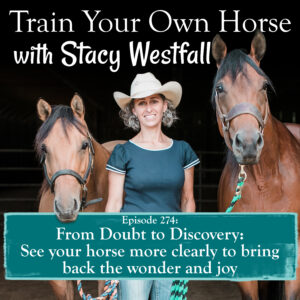Episode 274: From Doubt to Discovery: See your horse more clearly to bring back the wonder and joy

Anger, frustration, fear… to wonder and joy.
In this episode, three students share their challenges and growth with their horses inside the Resourceful Rider Program.
What stands out to me is how the riders are describing that they can see themselves and their horses more clearly. If I say it backward, before they experienced the shift, their emotions: angry, frustrated, scared…were actually altering what they were able to see.
Also listen for how they have learned to support and guide their horse’s training.
* shifting away from, ‘oh, no, there’s something wrong with me’
* finding humor while training
* learning to see a piece at a time, learning to see maneuvers in segments as pieces of a sequence
* learning when you live in a rural area
* the power of being in a community with other women that are trying to get better with their horses
This episode is filled with valuable insights, and by the end, you’ll see how it was possible for them…and it’s possible for you too.
SUBSCRIBE TO THE PODCAST HERE:





YOURS FREE
WHY IS MY HORSE...?

